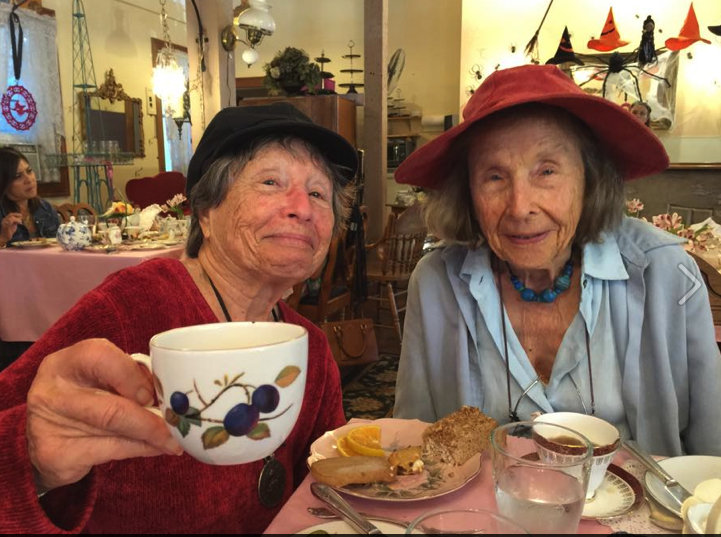Poets Prado Gomez, Julian née Sara Mithra, and Salon founder Ali Cannon also reading at the event
New independent publishing house Raven & Wren Press, which released its first poetry title earlier this month, After Rain a Little Girl Straightening Worms, by Florence Miller, is happy to announce that the author will kick off an evening of poetry at Hope in the Face of Despair, a Literary Salon for Our Timeson Saturday April 27, 2019, from 7-9 PM, at Loka Yoga, 2701 MacArthur Boulevard, in Oakland.

at the book launch held on April 7. Her son David Miller holds the microphone.
The Literary Salon is the brainchild of activist, community organizer and educator Ali Cannon, who said that the April 27threading is the first in an ongoing series featuring poets, writers, artists and others dedicated to inclusion and equity. “The times we are living in can overwhelm a person, but despair is not an option,” said Cannon. “The Literary Salon will provide us a place where we can gather to build community and raise our consciousness through discussion of literary responses to the world around us.”
A recognized leader in the transgender community, Cannon is one of the four featured poets on the evening’s line-up. His poetry appears in From the Inside Out: Radical Gender Transformation, FTM and Beyond, and his illumination of Jewish and transgender themes can be seen in the film, It’s A Boy: Journeys from Female to Male, and in the co-authored essay (with TJ Michels), Whose Side Are You On: Transgender at the Western Wall.
Poet Miller will begin the evening by reading from her new collection, After Rain a Little Girl Straightening Worms (Raven & Wren Press, 2019), published at the age of 96.
Miller is a founding member of Shakespeare’s Sisters, co-author (with Alexis Rotella) of a widely respected renga trilogy, and co-edited the anthology State of Peace: The Women Speak. She is a retired creative writing and English teacher from Oakland’s McClymonds High school. The 1972 Emmy-winning film by Allen Willis, Can You Hear Me? Young Black Poets from the Ghetto is based on her students and their work.
Joining Miller and Cannon are Prado Gomez, a Bay Area singer and writer born and raised in the San Francisco Mission District, whose writing reflects on family, race, gender, gentrification, and sexuality from his perspective as a Mestizo-American man of trans experience; and Oakland poet Julian née Sara Mithra, whose first book, If the Color Is Fugitive(Nomadic Press, 2018) follows vagrants around the collapsing frontier during a queer elsewhen. Mithra’s book is a finalist for a Lambda Literary Award, and their work has appeared in Versal 12, Milvia Street, Storm Cellar, Sharkpack Annual, Anxy, Name and None, and inside bags of Nomadic Coffee.
Loka Yoga is a scent-free environment and everyone is requested to please remove shoes. Suggested donation for the event is $10.
